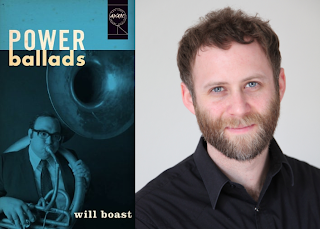Years ago, I read a disappointing short story collection by an unknown author, the recent winner of a respected short story contest sponsored by a university press. In the last few years, some have criticized contests like this for occasionally publishing work not yet ripe, and, alternately, for declining to award prizes when no submissions are deemed worthy.
Although the collection was negligible and the author hasn't published a book of fiction since, I still sometimes check out the winners of prizes like the Flannery O'Connor Award for Short Fiction and the Iowa Short Fiction Award if the subject matter interests me and/or the author receives favorable reviews. Why?
Will Boast is why.
Boast is the author of Power Ballads, winner of the Iowa Short Fiction Award and one of the best books I read last year. If I didn't work in a library and read publications like Publishers Weekly and Booklist, I probably wouldn't know of it, since neither the Chicago Tribune nor The New York Times bothered to review it. But the reviews in the former publications piqued my interest with their praise of Boast as well as his subject matter: musicians and those who orbit their lives. The jacket copy, too, intrigued me with its mention of "practice rooms," signalling a realistic rather than romanticized take on musicians and their lives.
His stories concern not the Lady Gagas of the world but characters like Tim, a tuba-playing adolescent who, in the aftermath of his mother's death, begins sitting in with a tavern polka band in Wisconsin, often displacing Ertold, its regular tubist. Tim is featured in several stories, including one of my favorites, the title story, "Power Ballads," which is framed by the now adult Tim, a jazz-loving professional drummer in Chicago, telling his girlfriend the story of his time with a band called Soldier. "I remembered them [Soldier], barely," he says of the day he saw their ad for a drummer. "A last-gasp eighties band that had lingered into the nineties like a stubborn stain before being erased by grunge and 'alternative.'" New to the city and taking any gig he could get, he signed on with Soldier, though he loathed their music and had to pretend to be committed to their future, all the while "calculating when to bail" on these men he came to have genuine affection for.
Another pitch-perfect story set in Chicago, "Heart of Hearts: ***1/2," is about the friendship of roommates Holly and Kate (the latter Tim's girlfriend in "Soldier"). Former choir-mates in high school, affluent Kate and working class Holly, the latter a gifted singer, grow apart as Holly remains steadfast to music and Kate considers law school and relocating to Lincoln Park. Holly suggests the ambivalent Kate hold off on law school to determine what she really loves. Kate loves Holly's music yet thinks: "But where would Holly be in ten years, twenty? Hardly anyone made a living in music." Boast gets the little details right, from psuedo-intellectual music critics to Kate's accusation that Holly's boyfriend is slumming, an accusation that Holly could--but doesn't--fling back at Kate. It's one of the most nuanced stories I've read about women's friendships.
Other stories feature the wife of a musician who has sacrificed much for his career and a choir director and former rhythm and blues singer who sometimes doubts his ability to reach his rap-loving teenage choir. Reading these stories, one hopes Will Boast never doubts the value of his fictional offerings: these stories are a wonderful gift to readers and proof that university presses and contests like the Iowa Short Fiction Award are a service to literature. Among the other writers first published as winners of the Iowa Short Fiction Award and the Flannery O'Connor Award are Robert Boswell and Ha Jin.
Who is your favorite author who isn't yet well-known but should be?


No comments:
Post a Comment
Please leave your comments and suggestions here. Thanks!
Note: Only a member of this blog may post a comment.